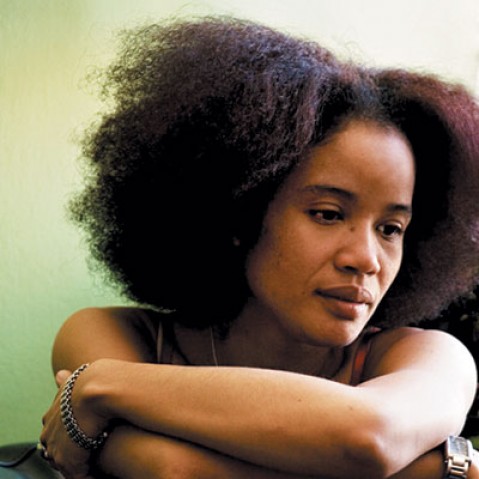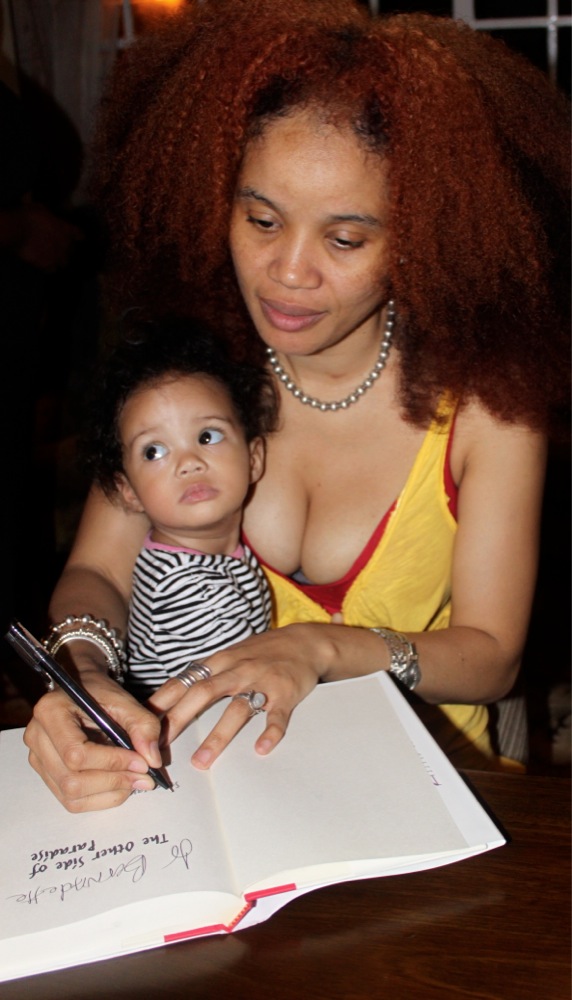Interview with Staceyann Chin

In early February, we hosted Staceyann Chin for a series of conversations and performances here in Nairobi. In this interview conducted during the visit (after a morning spent at Maasai Market), she openly explores her experience of having to confront the familiar nuances present in her interactions with people in Kenya – patterns similar to her upbringing in Jamaica – and talks about her journey of accessing her voice, her search for belonging, her transformed idea of kinship and her vision for the future.
__________________________
Tweet This,
you Small-Minded Motherfucker!

On February 15th, we held “An Evening with Staceyann Chin” at the Southern Sun Mayfair Hotel in Nairobi, where Staceyann Chin performed some of her poems and read excerpts from her book (read about one of our guest’s experiences here). One of the poems she performed during the evening was “Tweet This, You Small-Minded Motherfucker!” – a response to a chauvinist tweet sent to her. Watch the performance below:
__________________________
All Oppression is Connected
By Kenne Mwikya
Staceyann Chin’s shoulders move to the hip-hop booming from the hall’s speakers before the start of her show. She later comments that this is part of her process – sitting among the audience, quietly collecting and analyzing tidbits of conversation to be used over the course of her show. The accumulating crowd drones loudly: chatting, friends recognizing each other, laughter. The audience is young, cosmopolitan and smart-phoned. For the first time that day I ask myself “Why am I here?”

STACEYANN CHIN PERFORMING AT “AN EVENING WITH STACEYANN CHIN”. PHOTO: DAN MUCHINA
The hall is full and the show is finally on the road. If there’s anything I got from the performance – something not apparent from reading or watching Staceyann Chin online – it’s her presence, her insistence on being in touch with her audience. She does not use the microphone at first because we “listen a little louder without it”.
She implores us to individually promise that I’m gonna decide to go with this woman. Many times during the show she would stop and ask how we, the audience, felt. The performance was premised on rapport and mutual satisfaction, something that went beyond finding her show entertaining or enlightening: it was radical, feminist consciousness-raising.
Reading an excerpt from her book, she weaves religion with methods of patriarchal domination and homophobia, about “funny men” from Sodom and Gomorrah who are worse than blasphemers, about being forced by a Sunday school teacher to write down ten reasons men are ordained by God to dominate women. In another, she talks about sexual abuse by a family member and the loneliness she feels when no one takes her side, even facing violence when she promises that she will protect herself if she is abused again.
In university, a supposed liberal and inclusive space, she is ostracized and sexually abused again for coming out. All this is the context of a deeply personal memoir highlighting resilience and triumph in the face of poverty, sexism, homophobia and patriarchy. But all this is not without moments of lightheartedness: a highly intellectual and sophisticated teenage relationship between Staceyann and an older boy ends abruptly when the boy writes back about masturbating while dreaming about her, and another ends in much the same way after another bad-kisser boyfriend demands that they take the relationship to a “serious” level.
Staceyann is a wonderful storyteller and in many ways, her memoir defies the expectation of tragedy in the appreciation of Black literature, something that Staceyann acknowledges at the start of her book reading.
Her poetry is fire, a mix of performance and raw emotion harkening back to feminism’s second wave appropriation of poetry in a way that created a counterpoint to the masculine and racialised “rationalism” of its day. Watching her perform reminded me of Audre Lorde’s phrase “it feels right to me” in her short essay “Poetry is not a Luxury”. Indeed, it is not. Staceyann manages to use her poetry as the light that gives new meaning to issues of imperialism, Haiti, 9/11 and its attendant racist re-orientations and assimilation.
In another piece, she angrily and righteously (as far as radical, anger-affirming feminism is concerned) responds to a chauvinist and racist tweet sent by a man. Again, I am reminded of feminism’s privileging of subjectivity in the face of masculine aggression or patriarchal violence.
Embedded within current global and local political developments, I couldn’t help but marvel at the aptness of Staceyann’s performance. Locally, the election season will see a spike in homophobic and sexist discourse. In fact, a prominent politician recently compared homosexuals to dogs (inside the Nairobi All Saints Cathedral) and recent party caucuses were marred with violence and harassment against women aspiring for political office.
In response to a question pointed to her by a member of the audience, Staceyann expressed her disagreement with global trajectories of the global human LGBTIQ rights movements which were abandoning a multi-issue model and thus isolating potential supporters.
During the question time, I asked a question as to whether she thought there was a duty to those were from privileged backgrounds to align themselves with and practice progressive politics. I felt that it was really important for Staceyann to talk about this issue lest the event go by as just another round of eccentricities by a hyphenated American poet. In response, she asked me to read out an inscription on one of her tattoos out loud: “All Oppression is Connected”.
+++++++++++++
Kenne Mwikya is a student, blogger, feminist and social-justice commentator.
>via: http://www.becauseartislife.org/blog/24/6/2013-all-oppression-is-connected


